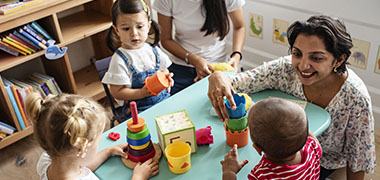
AI Occupational Exposure score unavailable For more insight, research the specific tasks and skills required for the role.
Explore all careersChild Psychologists provide therapy and counselling to children, teens, and families, addressing trauma, mental health, disabilities, and developmental issues.
Get qualified to work as a Child Psychologist with a course recognised across Australia. Speak to a training provider to learn more.
Browse occupations related to Child Psychologist
The average salary for Child Psychologists in Australia is $104,000 per annum. These are median figures for full-time employees and should be considered a guide only.
 Courses.com.au Team
Courses.com.au Team
There are approximately 1,200 specialist psychologists working in Australia right now, some of these are Child Psychologists. They are employed by schools, hospitals, community health organisations, NGOs, and government organisations. Many Child Psychologists work independently through their own private practice.
 Courses.com.au Team
Courses.com.au Team
To become a Child Psychologist you must complete a Bachelor’s degree in psychology approved by the Australian Psychology Accreditation Council (APAC). Examples include: Bachelor of Arts (Psychology), Bachelor of Psychology, Bachelor of Psychological Science, and Bachelor of Science (Psychology). Choose child protection, human development, attachment disorders, trauma, and family counselling electives. The next step is to become a fully registered Clinical Psychologist. This involves completing a Master of Psychology (Clinical Psychology), undertaking a one-year internship, and then passing the National Psychology Exam. Finally, you’ll need post-graduate studies to specialise in Child Psychology. Suitable qualifications include the Graduate Diploma of Counselling (Child, Youth & Family Therapy) or Master of Child and Adolescent Mental Health.
Source: Australian Government Labour Market Insights 2023
 Courses.com.au Team
Courses.com.au Team



Child Psychologists are clinical psychologists who provide treatment, therapy, and counselling to children, teens, and adolescents. They help the child (as well as parents and caregivers) navigate trauma, abuse, divorce, bereavement, bullying, isolation, disabilities, terminal illness, mental health diagnosis, and developmental issues.
As a Child Psychologist you could be conducting an initial assessment of a new client, teaching a teenager who is experiencing anxiety how to navigate daily life at school, listening to a child describe how they are feeling about the death of their grandmother, having a follow-up session with the parent of a young child with autism, attending a conference for health professionals, or just scheduling some self-care into your busy calendar.